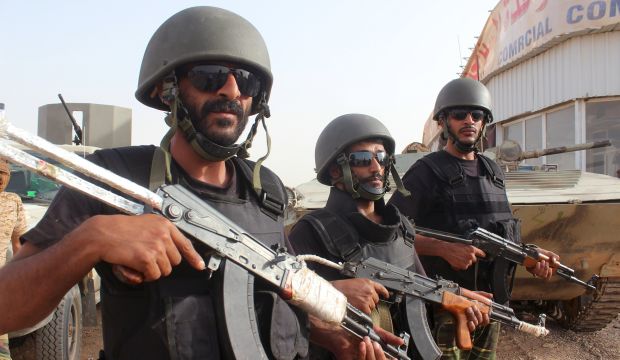
Soldiers loyal to Yemeni President Abd Rabbuh Mansur Hadi stand near their vehicle at an army post in Al-Abr on Yemen’s northeastern border with Saudi Arabia on July 9, 2015. (REUTERS/Stringer)
The UN has said it expects an unconditional humanitarian truce will begin in Yemen on Friday, lasting until the end of the Muslim holy month of Ramadan on July 17th.
“The Secretary-General [Ban Ki-moon] looks forward to the commitments of all parties to the conflict in Yemen to an unconditional humanitarian pause to start on Friday … until the end of Ramadan,” UN spokesman Stephane Dujarric said on Thursday.
Yemen descended into crisis after Houthi militants, backed by Iran, overran the capital Sana’a in September, prompting the internationally recognized President Abd Rabbuh Mansur Hadi to flee to Aden and then to the Saudi capital Riyadh.
In response to a call for intervention by Hadi, Saudi Arabia began an aerial campaign in Yemen in late March to drive back the Houthis and restore the beleaguered president to power.
A five-day humanitarian ceasefire, proposed by the Saudi-led coalition, took place in Yemen in May.
Riyadh Yassin, Yemen’s Foreign Minister, told Asharq Al-Awsat that the truce the UN declared “had been called for by the [international organization] rather than the Yemeni government.”
Yassin urged “warring factions on the ground, particularly the Houthis and their allies, to comply with the truce and refrain from obstructing the ceasefire [efforts].”
Hadi and Saudi Arabia accuse Yemen’s powerful former president Ali Abdullah Saleh of colluding with the Houthis who control large parts of the country.
The FM said he doubted the truce would be honored by the Houthis and Saleh’s followers, arguing that they gave “unclear” guarantees to the UN Envoy to Yemen Ismail Ould Cheikh Ahmed.
“Today [Thursday] there was shelling with Katyusha rockets on the cities of Aden and Taiz by the Houthi militia and the followers of the ousted former president Saleh,” he said, adding that “the Popular Resistance is set to defend its lands.”
While the Saudi-led coalition has been targeting the Houthis from the air, pro-Hadi forces, known as the Popular Resistance, have engaged the rebels on the ground.
The exiled foreign minister said his government was not against a humanitarian pause in Yemen, but worried that the Houthis would take advantage of the truce to extend their reach.
The seven-day truce “could be extended if the Houthis and their allies showed seriousness,” Yassin added.
Pro-Hadi forces in Aden warned that unless the Houthis withdrew from the strategic city, they would not comply with the truce.
“The resistance’s demand is that the aggressors withdraw completely [from the city],” Ali Al-Ahmadi, a spokesman for the Popular Resistance force, said, referring to the Houthi militants.
Representatives of the tribes that support Hadi’s government said they would rather continue fighting than accept a truce that could result in more gains for the Houthis.
A senior tribal figure in the southern Shabwa province said: “Tribes are capable of holding out against Houthi insurgents and Saleh’s followers and they have won several battles, arresting hundreds of [insurgents].”
Meanwhile, informed sources told Asharq Al-Awsat that the Houthis and their allies plan to recruit more volunteers from the northern governorates as they intend to advance towards the strategic Ma’rib province.
Ma’rib is the country’s main oil and gas hub, and provides Yemen—the poorest country in the Arabian peninsula—with the bulk of its electricity and a sizable portion of its income.
Additional reporting contributed by Arafat Madabish from Sana’a.
